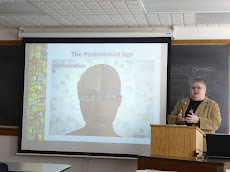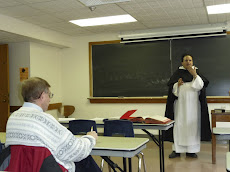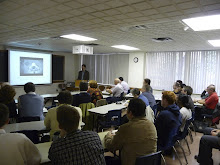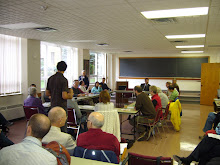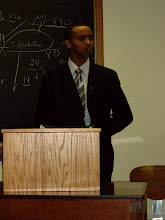The Dominican Rite: Liturgy Reflecting Spirituality
by Rev. Marcos Ramos, O.P., B.A., M.A., MDiv, ThM, PhD. student (St. Michael’s College)
The Order of Preachers (Dominican Order) used before the changes of the Second Vatican Council its proper rite, created in order to help the friars celebrate their liturgy using elements of the Dominican tradition and spirituality. This paper will provide an overview of this Dominican Rite and how it reflects the historical and liturgical tradition that is essential to the order founded in the thirteenth century by Dominic of Guzman.
Wednesday, January 21, 2009 3:30-4:30 pm
Source and Summit of Spiritual Life: Foundations of the writings of Sts. John of the Cross and Teresa of Avila in the Church’s Eucharistic Liturgy
by Rev. Steve Wlusek, B.A., M.Div., M.A., Th.D. cand. (St. Michael’s College)
 A parallel can be recognized between the liturgical actions of the Church’s celebration of the Eucharist and the key elements of the spiritual itinerary proposed by Carmelite mystics John of the Cross and Teresa of Avila. The emphasis that Teresa and John place upon the necessary elements of the spiritual journey, the sense of structure or order that is inherent within the soul’s path towards union with God, and the progression or movement from one spiritual plane to another reveal a close connection between the spiritual theology they present and the Church’s Eucharistic theology as expressed through its liturgical rites. This presentation will demonstrate that the spiritual theology of Sts. John of the Cross and Teresa of Avila is founded upon principles underlying the Church’s Eucharistic liturgy, and will underscore the correlation between the spiritual journey of the worshiping community and that of individual believers.
A parallel can be recognized between the liturgical actions of the Church’s celebration of the Eucharist and the key elements of the spiritual itinerary proposed by Carmelite mystics John of the Cross and Teresa of Avila. The emphasis that Teresa and John place upon the necessary elements of the spiritual journey, the sense of structure or order that is inherent within the soul’s path towards union with God, and the progression or movement from one spiritual plane to another reveal a close connection between the spiritual theology they present and the Church’s Eucharistic theology as expressed through its liturgical rites. This presentation will demonstrate that the spiritual theology of Sts. John of the Cross and Teresa of Avila is founded upon principles underlying the Church’s Eucharistic liturgy, and will underscore the correlation between the spiritual journey of the worshiping community and that of individual believers.
by Rev. Steve Wlusek, B.A., M.Div., M.A., Th.D. cand. (St. Michael’s College)
 A parallel can be recognized between the liturgical actions of the Church’s celebration of the Eucharist and the key elements of the spiritual itinerary proposed by Carmelite mystics John of the Cross and Teresa of Avila. The emphasis that Teresa and John place upon the necessary elements of the spiritual journey, the sense of structure or order that is inherent within the soul’s path towards union with God, and the progression or movement from one spiritual plane to another reveal a close connection between the spiritual theology they present and the Church’s Eucharistic theology as expressed through its liturgical rites. This presentation will demonstrate that the spiritual theology of Sts. John of the Cross and Teresa of Avila is founded upon principles underlying the Church’s Eucharistic liturgy, and will underscore the correlation between the spiritual journey of the worshiping community and that of individual believers.
A parallel can be recognized between the liturgical actions of the Church’s celebration of the Eucharist and the key elements of the spiritual itinerary proposed by Carmelite mystics John of the Cross and Teresa of Avila. The emphasis that Teresa and John place upon the necessary elements of the spiritual journey, the sense of structure or order that is inherent within the soul’s path towards union with God, and the progression or movement from one spiritual plane to another reveal a close connection between the spiritual theology they present and the Church’s Eucharistic theology as expressed through its liturgical rites. This presentation will demonstrate that the spiritual theology of Sts. John of the Cross and Teresa of Avila is founded upon principles underlying the Church’s Eucharistic liturgy, and will underscore the correlation between the spiritual journey of the worshiping community and that of individual believers.Wednesday, February 4, 2009 3:15-4:15 pm
The Primitive Egyptian Eucharist
by Bishoy Dawood, B.A., M.T.S., Th.D. student (St. Michael’s College)
 In the twentieth century, many liturgical scholars studied the origins of the Christian liturgical rites, but the majority of these studies focused on how the words of the known Anaphora prayers were derived from earlier Jewish prayers. It is rare to find works that focus on the ritualistic actions of liturgical rites from a historical-developmental perspective. This presentation will focus on presenting a Eucharistic tradition that consists of ritualistic action and will argue that the Coptic rite of the “Offertory," which is still in use in the Coptic churches today and prayed before all the Anaphoras, is a primitive and complete Eucharistic rite.
In the twentieth century, many liturgical scholars studied the origins of the Christian liturgical rites, but the majority of these studies focused on how the words of the known Anaphora prayers were derived from earlier Jewish prayers. It is rare to find works that focus on the ritualistic actions of liturgical rites from a historical-developmental perspective. This presentation will focus on presenting a Eucharistic tradition that consists of ritualistic action and will argue that the Coptic rite of the “Offertory," which is still in use in the Coptic churches today and prayed before all the Anaphoras, is a primitive and complete Eucharistic rite.
by Bishoy Dawood, B.A., M.T.S., Th.D. student (St. Michael’s College)
Wednesday, March 4, 2009 3:15-4:15 pm
Exploring the Notion of Intercultural Worship
Rev. Teresa A. Burnett-Cole, B.A., M.Div., Th.D. cand. (Emmanuel College). Minister, Riverdale United Church, Toronto
 Worship in the post-colonial age presents particular challenges. What are the theological imperatives behind intercultural worship? What are its possible guiding principles? What might such worship look like? This presentation will explore the challenges interculturalism presents in the field of liturgical theology and offers some possible ways forward in the dialogue.
Worship in the post-colonial age presents particular challenges. What are the theological imperatives behind intercultural worship? What are its possible guiding principles? What might such worship look like? This presentation will explore the challenges interculturalism presents in the field of liturgical theology and offers some possible ways forward in the dialogue.
Rev. Teresa A. Burnett-Cole, B.A., M.Div., Th.D. cand. (Emmanuel College). Minister, Riverdale United Church, Toronto
Wednesday, October 1, 2008 3:15-4:15
The Orientation of Sacred Space and Liturgical Prayer. The Debate around the celebration versus populum in the Catholic Church
by David H. Pereyra, MArch. MA., PhD. cand. (St. Michael's College)
 The placement of the altar and the orientation of president and assembly in the liturgical celebration have become again matter for a heated theological debate. While the liturgical reform that followed Vatican II prescribed the orientation versus populum, Joseph Ratzinger, even before becoming Pope Benedict XVI, called into question the reasons for this change.
The placement of the altar and the orientation of president and assembly in the liturgical celebration have become again matter for a heated theological debate. While the liturgical reform that followed Vatican II prescribed the orientation versus populum, Joseph Ratzinger, even before becoming Pope Benedict XVI, called into question the reasons for this change.
The present paper explores both arguments for and against the orientation versus populum in contemporary liturgical debate.
by David H. Pereyra, MArch. MA., PhD. cand. (St. Michael's College)
 The placement of the altar and the orientation of president and assembly in the liturgical celebration have become again matter for a heated theological debate. While the liturgical reform that followed Vatican II prescribed the orientation versus populum, Joseph Ratzinger, even before becoming Pope Benedict XVI, called into question the reasons for this change.
The placement of the altar and the orientation of president and assembly in the liturgical celebration have become again matter for a heated theological debate. While the liturgical reform that followed Vatican II prescribed the orientation versus populum, Joseph Ratzinger, even before becoming Pope Benedict XVI, called into question the reasons for this change.The present paper explores both arguments for and against the orientation versus populum in contemporary liturgical debate.
Wednesday, November 5, 2008 3:15-4:15
Ta Hagia Tois Hagiois
("The Holy Things for the Holy People")
Eucharistic Rites in Late Fourth Century Jerusalem
 With Helena's discoveries, the "Holy Places" emerge in the fourth century, and a broad culture of pilgrimage develops. In the meantime, through stations and processions the liturgy begins appropriating these places, and by doing this, transforming them into "sacred space." The pilgrims, returning to their lands, brought back alongside with their intense spiritual experience the liturgical practices of the Holy City as well.
With Helena's discoveries, the "Holy Places" emerge in the fourth century, and a broad culture of pilgrimage develops. In the meantime, through stations and processions the liturgy begins appropriating these places, and by doing this, transforming them into "sacred space." The pilgrims, returning to their lands, brought back alongside with their intense spiritual experience the liturgical practices of the Holy City as well.
The lecture discusses the Eucharistic rites in Jerusalem in the witness of the bishop Cyril.
("The Holy Things for the Holy People")
Eucharistic Rites in Late Fourth Century Jerusalem
by Prof. Pablo Argárate, Dr. phil., Dr. theol. (Tübingen) (St. Michael’s College)
 With Helena's discoveries, the "Holy Places" emerge in the fourth century, and a broad culture of pilgrimage develops. In the meantime, through stations and processions the liturgy begins appropriating these places, and by doing this, transforming them into "sacred space." The pilgrims, returning to their lands, brought back alongside with their intense spiritual experience the liturgical practices of the Holy City as well.
With Helena's discoveries, the "Holy Places" emerge in the fourth century, and a broad culture of pilgrimage develops. In the meantime, through stations and processions the liturgy begins appropriating these places, and by doing this, transforming them into "sacred space." The pilgrims, returning to their lands, brought back alongside with their intense spiritual experience the liturgical practices of the Holy City as well.The lecture discusses the Eucharistic rites in Jerusalem in the witness of the bishop Cyril.
Wednesday, December 3, 2008 3:15-4:15
Liturgical Reform in Contemporary Judaism:
Is it Necessary? Does it Work?
by Rabbi Dow Marmur, PhD (Senior Rabbi of Holy Blossom, Toronto)
 In line with Heinrich Heine's dictum that "Jews pray theology," non-Orthodox movements in Judaism, particularly Reform, have tended to adjust the traditional liturgy to fit their theological orientation. As a result, new prayer books have been created in different countries, often every 25 years or so - as the theologies have been revised.
In line with Heinrich Heine's dictum that "Jews pray theology," non-Orthodox movements in Judaism, particularly Reform, have tended to adjust the traditional liturgy to fit their theological orientation. As a result, new prayer books have been created in different countries, often every 25 years or so - as the theologies have been revised.
This paper addresses the complex question on whether these noble and often creative efforts help people to pray, or if they are primarily the result of eager editors and hopeful promoters.
Is it Necessary? Does it Work?
by Rabbi Dow Marmur, PhD (Senior Rabbi of Holy Blossom, Toronto)
 In line with Heinrich Heine's dictum that "Jews pray theology," non-Orthodox movements in Judaism, particularly Reform, have tended to adjust the traditional liturgy to fit their theological orientation. As a result, new prayer books have been created in different countries, often every 25 years or so - as the theologies have been revised.
In line with Heinrich Heine's dictum that "Jews pray theology," non-Orthodox movements in Judaism, particularly Reform, have tended to adjust the traditional liturgy to fit their theological orientation. As a result, new prayer books have been created in different countries, often every 25 years or so - as the theologies have been revised.This paper addresses the complex question on whether these noble and often creative efforts help people to pray, or if they are primarily the result of eager editors and hopeful promoters.
Wednesday, January 16, 2008 3:00-4:00
Church Building in Quebec. The Secular Uses
by Richard Gauthier, PhD. (Trinity College)
As the sociologist Peter Berger wrote, Quebec, the former "priest-ridden" province, is now among the most secularized societies in the Western hemisphere. The impact in Church Building is the increasing number of the secular uses. The author present the phenomenon and, at the end, he proposes some ideas for the future.
by Richard Gauthier, PhD. (Trinity College)
As the sociologist Peter Berger wrote, Quebec, the former "priest-ridden" province, is now among the most secularized societies in the Western hemisphere. The impact in Church Building is the increasing number of the secular uses. The author present the phenomenon and, at the end, he proposes some ideas for the future.
Wednesday, February 13, 2008 3:00-4:00
Restoration of the Jerusalem Temple in Medieval Christian Liturgy
by Prof. Jennifer Harris, PhD. (St. Michael’s College)
A number of rites in the medieval Church borrowed their meaning and gestures from the long-destroyed Jerusalem Temple. In this seminar, I examine three types of borrowing that pervade Christian liturgy in the High Middle Ages: the ordo for the dedication of a church (and its annual commemoration), the Maundy Thursday liturgy performed once a year at the Lateran, and weekly eucharistic rites. My focus is on the Roman rites of the twelfth and thirteenth centuries.
by Prof. Jennifer Harris, PhD. (St. Michael’s College)
A number of rites in the medieval Church borrowed their meaning and gestures from the long-destroyed Jerusalem Temple. In this seminar, I examine three types of borrowing that pervade Christian liturgy in the High Middle Ages: the ordo for the dedication of a church (and its annual commemoration), the Maundy Thursday liturgy performed once a year at the Lateran, and weekly eucharistic rites. My focus is on the Roman rites of the twelfth and thirteenth centuries.
Wednesday, March 19, 2008 3:00-4:00
The Dialectic of Worship in The United Church of Canada
by Prof. William S. Kervin, ThD. (Emmanuel College)
Only recently has the history of worship in The United Church of Canada received significant scholarly attention. The methodological challenges of such study are challenging because its Reformed Protestant and “Free Church” roots render many text-based liturgical methodologies of limited use. This presentation (based on a chapter in a forthcoming history of the United Church) conceives the liturgical history of the United Church as an on-going dialectic in which the interplay of text and context results in a uniquely complex liturgical tradition. From the union of 1925 to the emerging postmodernity of the turn of the millennium, United Church worship has been both a reflection of, and window on, each era. Its major worship resources, liturgical patterns and conciliar politics reveals its liturgical life to be a context-specific tradition perpetually in the process of selective recovery and renewal.
by Prof. William S. Kervin, ThD. (Emmanuel College)
Only recently has the history of worship in The United Church of Canada received significant scholarly attention. The methodological challenges of such study are challenging because its Reformed Protestant and “Free Church” roots render many text-based liturgical methodologies of limited use. This presentation (based on a chapter in a forthcoming history of the United Church) conceives the liturgical history of the United Church as an on-going dialectic in which the interplay of text and context results in a uniquely complex liturgical tradition. From the union of 1925 to the emerging postmodernity of the turn of the millennium, United Church worship has been both a reflection of, and window on, each era. Its major worship resources, liturgical patterns and conciliar politics reveals its liturgical life to be a context-specific tradition perpetually in the process of selective recovery and renewal.
Subscribe to:
Posts (Atom)




